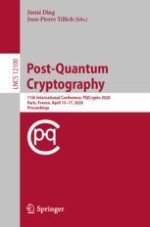2020 | OriginalPaper | Buchkapitel
A Note on the Instantiability of the Quantum Random Oracle
verfasst von : Edward Eaton, Fang Song
Erschienen in: Post-Quantum Cryptography
Aktivieren Sie unsere intelligente Suche, um passende Fachinhalte oder Patente zu finden.
Wählen Sie Textabschnitte aus um mit Künstlicher Intelligenz passenden Patente zu finden. powered by
Markieren Sie Textabschnitte, um KI-gestützt weitere passende Inhalte zu finden. powered by
